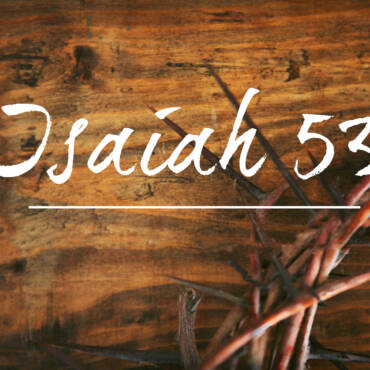Can A Man Become God?

By Sam Nadler
Though some say in December, others say in the fall (around Sukkot), yet it is mere speculation when exactly Yeshua the Messiah was born. However, the fact that He was born is both historical and wonderful! But, one of the Jewish objections to faith in Yeshua is: “a man cannot become God.” This objection is born out of a mistaken notion that Yeshua, a man, became God. This is not the message of the Scriptures, nor the faith of the Messianic believing community anywhere. The Hebrew Scriptures prophesy and the New Covenant declares that in Yeshua, God Himself, Adonai, became a man—He took on human flesh. Three questions raised on this issue help us consider it more fully: 1) Can God come in the flesh? 2) Was Messiah expected to be God? 3) Did the New Covenant declare Him as such?
Can God Come In The Flesh?
To find the answer let’s look at the visitation to Abraham in Genesis 18:1. The passage begins, “the Lord appeared to him by the Oaks of Mamre”. The next verse states that as he lifted his eyes, three men stood by him. Abraham and Sarah then prepared food for these guests (18:3-8). Was it merely a vision? Impossible, for not only do you not prepare food for a vision, but visions don’t eat, and these men did (Genesis 18:8).
Now, two of these three men are later identified as angels (Genesis 18:22; 19:1). However, the third, who ate (v.8), spoke (v.10), and walked with Abraham (v.16, 22), is identified as “the Lord” Himself. In Genesis 18:13, the text states, “And the Lord said to Abraham…”
The word translated “Lord” throughout this portion is called the Tetragrammaton— the four Hebrew letters that make up the sacred Name of God (yud, hey, vav, and hey). Do the Hebrew Scriptures teach that God came in the flesh? Clearly, the answer is yes!
However, what was the Biblical expectation for the Messiah? Was he to be God incarnate? The Prophets, especially Isaiah and Micah, most directly answer this. Isaiah wrote: “For a child shall be born to us and a son shall be given; and the government shall be upon His shoulder; and His name shall be called: Wonderful Counselor, Might God, Everlasting Father, Prince of Peace” (Isaiah 9:6).”
This is traditionally recognized as referring to Messiah: “I have yet to raise up the Messiah, of whom it is written, for a child is born to us [Isaiah 9:6]” (Deuteronomy Rabbah 1:20).
Isaiah predicts that one coming from the Galilee will bring light, joy and victorious peace because He is the Prince of Peace (Sar Shalom) and, indeed, the Mighty God (El Gibbor, Isaiah 9:1-5). This child to be born is the theme of Isaiah 7:12, where it states He would be born of a virgin (Isaiah 7:14). He is the root of David that Gentiles will trust in (Isaiah 11:10), as well the remnant of Israel (Isaiah 10:20-23).
The truth of who this One will be is tolerated when the Scripture says that not every Jewish person will believe, but only a remnant: “the remnant shall return, the remnant of Jacob, to the Mighty God [El Gibbor]” (Isaiah 10:21).
Micah the prophet gives further detail about Messiah’s Divine Nature and specifically from where He would come:
“But you, Bethlehem Ephratah, little among the thousands of Judah, out of you will go forth for Me, One who will be ruler in Israel, whose goings forth have been from days of eternity.” (Micah 5:2)
Micah clearly states that Israel’s ruler would not only come from Bethlehem, but his goings forth would be from eternity. That is, He who would be born in Bethlehem is God, the Eternal One! Thus the Messiah—the One to bring peace, joy and life to all who would believe (the remnant); the One who would be born in Bethlehem, yet live in Galilee—this One is the Lord, the Mighty God Himself!
Does The Scripture Proclaim Yeshua as Messiah and God?
Hundreds of times the New Covenant unequivocally declares Yeshua to be the Messiah. (The word “Christ” is a transliteration, not a translation, of the Greek word Christos, translated correctly into English as “Messiah” or “anointed one.”) His Deity is indicated repeatedly by His title “Lord” and His identification as the Lord of the Hebrew Scriptures. Please note that when referring to Yeshua, the New Covenant repeatedly uses portions of the Old Testament (Tanakh) that actually refer to God (Mark 1:1-3, Heb. 1:8-12).
The New Covenant writers were clear regarding Messiah’s Divine nature: “In the beginning was the Word, the Word was with God, the Word was God… and the Word became flesh and dwelt among us” (John1:1, 14).
Mostly, Yeshua’s divinity was assumed and written about in order to make an application for our lives:
Each of you should not look merely to your own interests but also to the interests of others. Your attitude should be the same as that of Messiah, who being in very nature God, did not consider equality with God something to be grasped, but humbled Himself, taking on the form of a servant, coming in human appearance. Being found in human form, He humbled Himself and became obedient unto death, even death by the cross (Philippians 2:4-8).”
What amazing love is demonstrated in the humility of our Messiah! The One who is the Eternal God, Adonai, came in the flesh to die for our sins and conquer death, that anyone might have forgiveness, life, joy, and peace by trusting in Him. No man can become a god, but in accordance with the Scriptures, God Himself took on human flesh in the person of Yeshua, the Messiah of Israel. May you be blessed as we celebrate Messiah’s birth.



